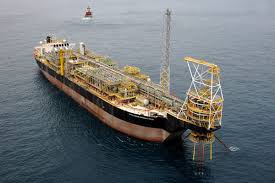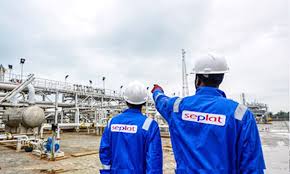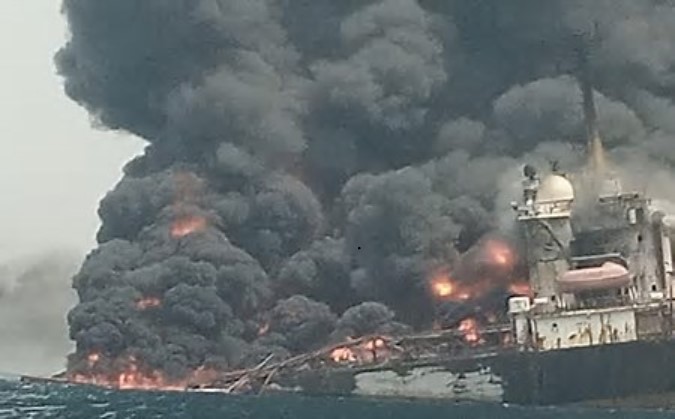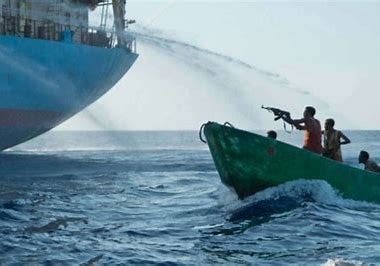
by EMMANUEL AKINSANYA | Dec 16, 2024 | Uncategorized
Nigeria is set to boost its oil production capacity with the unveiling of a $315 million Floating Production, Storage and Offloading (FPSO) vessel. The vessel, named ENEM FPSO, has a storage capacity of one million barrels and is expected to produce 17,000 barrels per day initially, increasing to 30,000 bpd.
Commissioned by Vice President Kashim Shettima at the Drydocks World Dubai Shipyard in Dubai, the vessel is a significant milestone for Nigeria’s oil and gas sector. It’s also a testament to the success of President Bola Ahmed Tinubu’s reforms in the sector.
Key Highlights:
- Production Capacity: 17,000 barrels per day initially, increasing to 30,000 bpd
- Storage Capacity: One million barrels
- Departure and Commencement: Expected to depart for Nigeria in Q1 2025 and commence production at the Okwok Oil Field in the first half of 2025
- Investment: $315 million
- Significance: First FPSO to be fully funded by a Nigerian indigenous company
The vessel is expected to contribute significantly to Nigeria’s economic growth and energy security. It’s also a symbol of Nigeria’s ambition and readiness to meet global energy demands

by EMMANUEL AKINSANYA | Dec 16, 2024 | Uncategorized
In a move that is expected to significantly boost Nigeria’s oil production, Seplat Energy Plc has completed its acquisition of Exxon Mobil Corp.’s onshore oil and gas assets in the country.
The deal, which was approved by the Nigerian government in October, will see Seplat Energy revive hundreds of idle oil wells, with the company’s Chief Operating Officer, Samson Ezugworie, stating that the focus will be on “rig intervention, short-term oil-generation activities, rejuvenating idle wells and bringing them back to production.”
The acquisition is expected to double Seplat Energy’s production, with the company’s CEO, Roger Brown, stating that the goal is to lift output to more than 200,000 barrels per day (bpd).
The deal is also expected to provide a significant boost to Nigeria’s economy, with Seplat Energy’s CFO, Eleanor Adaralegbe, stating that the acquisition is a good deal in terms of costs and returns.
Key Highlights of the Deal
- Seplat Energy has completed its acquisition of Exxon Mobil Corp.’s onshore oil and gas assets in Nigeria
- The deal is expected to revive hundreds of idle oil wells
- Seplat Energy’s production is expected to double as a result of the acquisition
- The company’s goal is to lift output to more than 200,000 bpd
- The deal is expected to provide a significant boost to Nigeria’s economy

by EMMANUEL AKINSANYA | Aug 1, 2024 | Uncategorized
A catastrophic fire erupted on a drilling platform owned and operated by Brittania-U, a leading indigenous oil exploration and production company in Nigeria, on Thursday. The incident occurred approximately 10.77 nautical miles south of Forcadoes Terminal in Delta State, a key oil-producing region in the country.
According to a statement released by the Nigerian Maritime Administration and Safety Agency (NIMASA), the agency’s Regional Maritime Rescue Coordinating Center (RMRCC) in Lagos received distress signals from the platform while it was in distress at the Ajakpa Field (OML 90). The RMRCC promptly responded to the emergency, triggering a swift rescue operation.
Fortunately, all 19 crew members on board the ill-fated platform were rescued successfully, thanks to the prompt and coordinated response of NIMASA and other responding agencies. The agency worked closely with first responders to ensure the safe evacuation of the crew and other exposed individuals during the incident.
In response to the incident, Dr. Dayo Mobereola, Director General of NIMASA, has established an incident command center in the office of the agency’s Executive Director Operations. This center will develop an effective situation-based response plan to mitigate potential oil spillage or other incidents affecting the marine environment and navigation safety.
Furthermore, NIMASA’s Marine Accident Investigation Unit has launched a comprehensive investigation into the direct and remote causes of this unfortunate incident. This investigation is mandated under the Merchant Shipping Act 2007, and its findings will be published. Recommendations arising from the investigation will be implemented to prevent similar incidents in the future.

by EMMANUEL AKINSANYA | Jul 30, 2024 | Uncategorized
In a significant development, Italian oil and gas giant Eni has announced that it has received formal regulatory approval from the Nigerian Upstream Petroleum Regulatory Commission (NUPRC) for the sale of its wholly-owned subsidiary, Nigerian Agip Oil Company Limited (NAOC), to Oando Plc. This approval marks a major milestone in the transaction, which will be the first deal to be approved under the Petroleum Industry Act (PIA) and under the new upstream regulatory body, the NUPRC.
Eni confirmed that it has obtained all necessary local and regulatory authorities’ authorizations, paving the way for the completion of the transaction. The sale of NAOC to Oando Plc will transfer ownership of Eni’s subsidiary, which focuses on onshore oil and gas exploration and production, as well as power generation in Nigeria. NAOC’s assets include a range of onshore oil and gas fields, as well as power generation facilities.
However, NAOC’s participating interest in the SPDC JV (Shell Production Development Company Joint Venture) will not be included in the transaction and will be retained in Eni’s portfolio. The SPDC JV is a significant joint venture between Shell, TotalEnergies, NAOC, and the Nigerian National Petroleum Corporation (NNPC), with Shell holding a 30% interest, TotalEnergies holding a 10% interest, NAOC holding a 5% interest, and NNPC holding a 55% interest.
Eni remains committed to Nigeria through investments in deepwater projects and Nigeria LNG. The company has a substantial portfolio of assets in exploration and production, with an equity production of approximately 40,000 barrels of oil equivalent per day net of NAOC contribution. Eni also holds a 10.4% interest in Nigeria LNG.
In addition to the sale of NAOC, Eni is also developing plans for economic diversification in Nigeria. These plans include assessing the potential production of agri-feedstock for EniLive bio-refineries and various nature- and technology-based projects, such as clean cooking initiatives to offset emissions.
Eni has been operating in Nigeria since 1962, with a long history of investment in the country’s oil and gas sector. The company’s commitment to Nigeria is demonstrated by its ongoing investments in deepwater projects and Nigeria LNG, as well as its plans for economic diversification.
Other companies, including Shell Petroleum Development Company (SPDC), ExxonMobil, Total Energies, and Equinor, are also in the process of getting approval for similar transactions. These transactions are part of a broader trend of divestment by international oil companies in Nigeria, as they seek to focus on core assets and reduce their exposure to onshore oil and gas production.

by james | Jul 26, 2024 | Uncategorized
Contrary to claims by the Nigerian Maritime and Safety Agency (NIMASA) and the Nigerian Navy (NN) that Nigeria has experienced zero piracy and attack incidents since 2022, a recent report by the Nigerian Ports Authority (NPA) reveals a disturbing reality. According to the NPA data, Nigeria witnessed four attacks on vessels and a staggering 74 other incidents on its waters in the first half of 2024.
The comprehensive data, provides a detailed breakdown of incidents from January 1 to June 30, categorized by port and incident type. A total of 78 incidents were recorded across all ports, including:
- Four attacks on vessels, highlighting the ongoing threat of piracy in Nigerian waters
- Five thefts, indicating a rise in criminal activity
- Seven accidents, underscoring the need for improved safety measures
- Four arrests, demonstrating the efforts of authorities to combat crime
- One assault, emphasizing the risks faced by crew members
- 13 cases of damage to NPA property, resulting in significant financial losses
- Seven deaths, tragically highlighting the human cost of these incidents
- Two cases involving arms and ammunition, raising concerns about the proliferation of weapons
- Five fire incidents, posing a significant threat to vessels and crew
- 11 protests, indicating growing tensions among stakeholders
- Three stowaways, highlighting the challenges of securing vessels
- Seven joint raiding operations, demonstrating the collaborative efforts of authorities
- Eight visits, showcasing the ongoing monitoring of ports
- One instance of trespassing on NPA land, emphasizing the need for enhanced security
The Lagos Port Complex (LPC) recorded the highest number of incidents, with 29 cases, including:
- An attack on a vessel, highlighting the vulnerability of ships
- Three accidents, underscoring the need for improved safety protocols
- Three arrests, demonstrating the efforts of authorities to combat crime
- One assault, emphasizing the risks faced by crew members
- Two thefts, indicating a rise in criminal activity
- Eight cases of damage to NPA property, resulting in significant financial losses
- Two deaths, tragically highlighting the human cost of these incidents
- One protest, indicating growing tensions among stakeholders
- Two stowaways, highlighting the challenges of securing vessels
- Two joint raiding operations, demonstrating the collaborative efforts of authorities
- Three visits, showcasing the ongoing monitoring of ports
- One instance of trespassing on NPA land, emphasizing the need for enhanced security
Other ports, including Tin Can Island Port Complex (TCIPC), Delta Ports, Calabar Port, Lekki Port, Rivers Port, Federal Lighter Terminal (FLT), Federal Ocean Terminal (FOT), and Kirikiri Lighter Terminal (KLT), also reported incidents ranging from attacks on vessels to thefts, accidents, and protests.






